
The president of the Republic of Moldova is the head of state of Moldova. The current president is Maia Sandu, who assumed office on 24 December 2020.

The Parliament of Moldova is the supreme representative body of the Republic of Moldova, the only state legislative authority, being a unicameral structure composed of 101 elected MPs on lists, for a period or legislature of 4 years. The Parliament of Moldova is elected by universal vote, equal directly, secret and freely expressed. The president of the Parliament of the Republic of Moldova is elected by the Parliament, with a minimum of 52 votes.
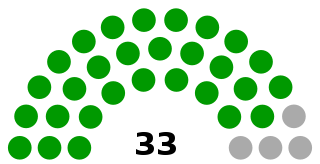
The Supreme Council of the Pridnestrovian Moldavian Republic is the parliament of Transnistria. The unicameral legislature consists of 33 seats, all of which are determined by single mandate constituencies. It is headed by a chairman.

The Supreme Council of National Defence is the autonomous administrative authority in Romania, invested by the Constitution with the task of organising and coordinating, by unanimous decisions, the activities related to the country's defence and national security.

Zinaida Greceanîi is a Moldovan politician. She was the President of the Moldovan Parliament between 8 June 2019 to 26 July 2021. Greceanîi was previously also the Prime Minister of Moldova from 31 March 2008 to 14 September 2009. She led the Party of Socialists of the Republic of Moldova (PSRM) from 2016 to 2020 and was previously a member of the Party of Communists of the Republic of Moldova (PCRM). She was Moldova's first female Prime Minister and was the second female Communist head of government in Europe, preceded only by Premier Milka Planinc of former Yugoslavia. She has been referred to by her colleagues in PSRM as the "Moldovan Margaret Thatcher".

The Party of Socialists of the Republic of Moldova is a democratic socialist political party in Moldova. A populist party, it holds Eurosceptic and Russophilic views, both of which are reflected by its long-time former leader Igor Dodon. It is contrasted to like-minded centre-left European parties for its conservative views on social issues, reflecting the country's strong social conservatism and the influence of the Moldovan Orthodox Church.

Presidential elections were held in Moldova on 16 December 2011. The president was elected by the parliament in an indirect election. After the election on 16 December failed, a second attempt was made on 15 January 2012. However, that vote was annulled as being unconstitutional since it had not been held in a secret vote. On 16 March, parliament elected Nicolae Timofti as president by 62 votes out of 101, with the PCRM boycotting the election, putting an end to a political crisis that had lasted since April 2009.
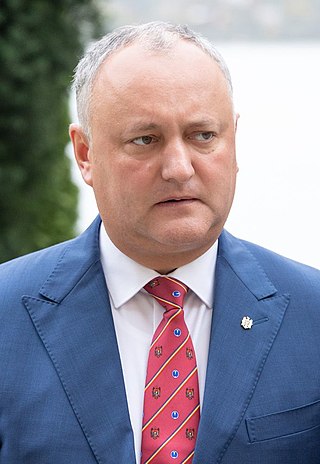
Igor Dodon is a Moldovan politician who previously served as the President of Moldova from 23 December 2016 to 24 December 2020. He currently serves as the leader of the Party of Socialists of the Republic of Moldova. He served as minister of trade and economics in the governments of Vasile Tarlev and Zinaida Greceanîi from September 2006 to September 2009 and was a member of the Parliament of Moldova from 2009 to 2016. He lost his bid for re-election in 2020 to Maia Sandu in a rematch whom he had defeated four years earlier in 2016.
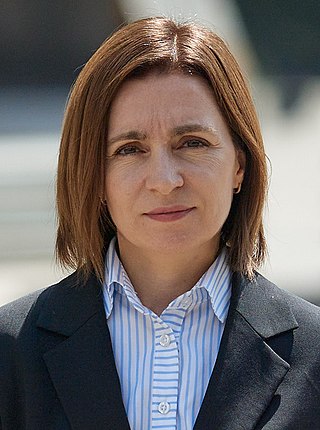
Maia Sandu is a Moldovan politician who has been the President of Moldova since 24 December 2020. She is the founder and former leader of the Party of Action and Solidarity (PAS) and former Prime Minister of Moldova from 8 June 2019 until 14 November 2019, when the government collapsed after a vote of no-confidence. Sandu was Minister of Education from 2012 to 2015 and member of the Parliament of Moldova from 2014 to 2015, and again in 2019. Sandu was elected President of Moldova in a landslide victory during the 2020 Moldovan presidential election. The first female president of Moldova, Sandu is a strong supporter of the accession of Moldova to the European Union, overseeing Moldova's granting of candidate status, and is considered 'pro-Western'. She has criticised and opposed Russia's invasion of Ukraine and supported subsequent steps to reduce Moldova's economic dependence on Russia, frequently expressing sympathy and support for Ukraine in the conflict. Sandu has made anti-corruption, economic reform and liberalisation a central part of her political platform, as well as closer integration with Europe. In February 2023, she accused Russia of seeking to stage a coup of the Moldovan government and has continued to seek to reduce Russia's influence over the country.

Andrian Candu is a Moldovan politician, who served as chairman of the Parliament of the Republic of Moldova between 2015 and 2019. He left political life and went back to consultancy business, where previously he has built a successful career. Candu served as Deputy Speaker of the Parliament of the Republic of Moldova from 30 May 2013 to 11 July 2014, Deputy Prime Minister, Minister of Economy of the Republic of Moldova from 2 July 2014 – 23 January 2015, Speaker of the Parliament Of the Republic of Moldova between 23 January 2015 – 24 February 2019, deputy of the PDM faction in the Parliament of the Republic of Moldova in 3 consecutive legislatures: 24 December 2010 – 11 July 2014, 9 December 2014 - 9 March 2019, 9 March 2019 – 19 February 2020. On 20 February 2020, together with five Members of the Parliament, Andrian Candu formed the "PRO MOLDOVA" Parliamentary Group, which was later registered as a political party, which he chaired for 1.5 years.
Iurie Chirinciuc is a Moldovan businessman turned politician, who has served as Minister of Transport and Roads Infrastructure of Moldova since 30 July 2015 until 30 May 2017. Prior to this, between 31 December 2014 and August 2015 he was a member of Parliament of Moldova, in the parliamentary faction of Liberal Party.
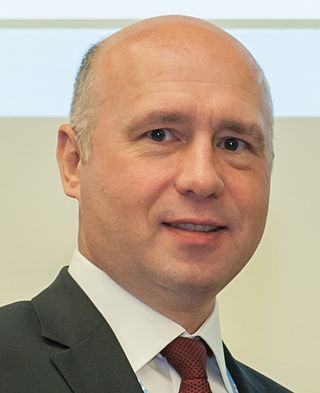
The Filip Cabinet was the Cabinet of Moldova led by Pavel Filip from January 2016 to June 2019.

Eugen Sturza is a Moldovan politician. He was the Minister of Defence of Moldova under President Igor Dodon and Prime Minister Pavel Filip. Sturza at the time of his appointment was the youngest member of the Filip Cabinet, at 33 years old.

The Moldovan National Army is the senior branch of the Armed Forces of the Republic of Moldova composed of the Air Force and the Land Forces. The National Army is considered to be the regular duty military force while the other branch of the armed forces, the Trupele de Carabinieri, is focused on paramilitary activities.
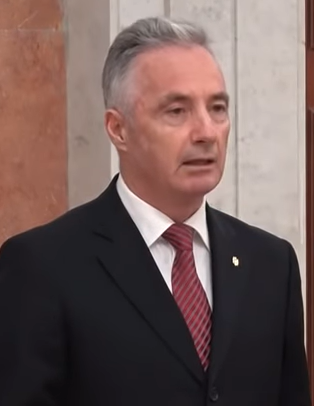
Victor Gaiciuc is a Moldovan military general, who served as Moldovan Minister of Defense from 2001 until 2004, 2019 until 2020 and 2020 until 2021. He was also the National Security Advisor to former president Igor Dodon. He is currently the chairman of the Union of Officers of Moldova and was also the secretary of the Supreme Security Council.

Snap parliamentary elections were held in Moldova on 11 July 2021. Following the resignation of Ion Chicu, the position of Prime Minister became vacant, with the Parliament being obligated to form a new government within three months. After the expiration of the constitutionally mandated period and two failed attempts to win parliamentary approval for the proposed cabinets, the Constitutional Court ruled on 15 April that the circumstances justifying a dissolution of the parliament were met. President Maia Sandu signed the decree dissolving the Parliament on 28 April and snap parliamentary elections were called on.

In mid-2019, a sequence of events following the 2019 Moldovan parliamentary election – and the subsequent attempts to form and install a new government, culminated in the positions of Prime Minister and Speaker of the Parliament, as well as the powers and duties of the President, being claimed by competing individuals.
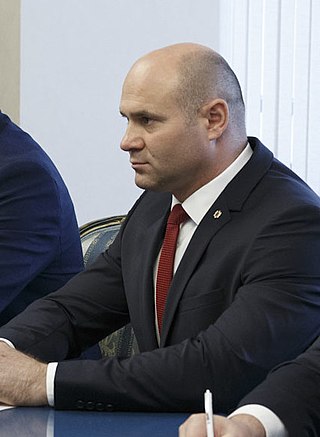
Pavel Voicu is a Moldovan politician who was the Minister of Defence of Moldova in the Sandu Cabinet and the Interior Minister under President Igor Dodon and Prime Minister Ion Chicu. He was also a personal advisor to Dodon. He has prior experience in Moldovan law enforcement.

Ion Chicu is a Moldovan economist and politician who served as Prime Minister of Moldova between 2019 until his resignation in 2020.
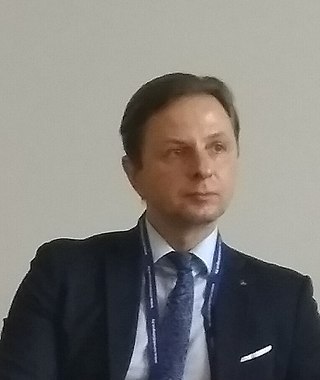
Vladislav Kulminski is a Moldovan politician.



















